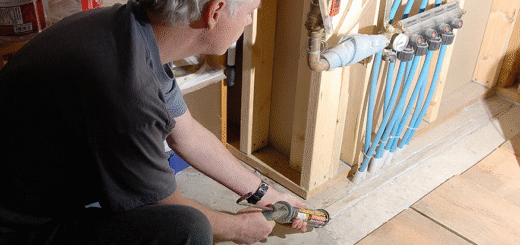Why Is My House So Humid? A Detailed Guide
Horace Bénédict de Saussure built the first hygrometer in 1783, a device used to measure humidity, and the device was built with hair!

Saussure took a screw and attached a piece of human hair. He maneuvered the remainder of the string of hair through a pulley and then attached a weight. As the hair took on moisture and curled, it moved the pulley.
The movement enabled him to calculate how much humidity was in the air.
While some humidity can be positive, though, too much can damage a home.
If you’re wondering why is my house so humid, keep reading to learn the common causes of humidity in a house and what you can do to alleviate it.
Why Is My House Humid?
Excessive humidity is uncomfortable. When moisture levels are high in a home, it can make us feel sticky and warm. Plus, it can damage a home.
High house humidity can be detrimental to one’s property, not limited to the condition, surfaces, and structure of a home.
Excessive moisture can lead to wood, paint, siding, and insulation damage. Plus, humidity can make your home more susceptible to allergens like mold, mildew, and dust mites.
Let’s take a look at some of the most common causes of high humidity in a home.
An Oversized AC
If your air conditioning unit is too big for your home or your room, it could be a cause of too much humidity.
Typically, AC helps dehumidify a room or a home. AC units have evaporator coils that cool down the air. While it’s running, the coil pulls the moisture or water from a particular room.
The process takes time, though. If your AC is too big for a room, it cools in short cycles. Thus, the dehumidifying process doesn’t have ample time to dehumidify the room.
A good rule is that if your AC only runs 10-15 minutes on a hot summer day, it’s likely oversized.
The Weather
Weather is one of the biggest culprits behind a high humidity level. If your home humidity is high, it could very well be due to a change in season.
In the summer, higher temperatures increase the moisture-retaining capacity of air. During colder seasons, the opposite occurs.
Humidity control benefits are plentiful, especially in environments with significant seasonal changes.
Daily Household Activities
Daily activities in a home can also increase moisture in a home.
Breathing, exercising, showering, and cooking all produce moisture. If you have a big family, these activities can produce significant moisture.
By making small changes in the routine, you can reduce the amount of moisture in your home.
Improper Ventilation
Without a proper ventilation system, excess humidity is an inevitability, especially in warmer climates.
In rooms where excessive moisture exists, such as the laundry room or kitchen, proper ventilation is a must. Otherwise, it can become uncomfortable to be in those rooms. Plus, significant damage can occur.
Rooms or basements without windows are common spots for moisture buildup as well.
Damp Areas
Damp areas in the floor or the wall is one of the main reasons for house humidity.
Sometimes, moisture can come through the soil, either through wall bricks or the floor. It’s easy to detect damp areas in your home when there are wet patches on the wall or the floor.
If you notice these, you shouldn’t hesitate to call a professional for an assessment. Waiting can only further the damage and the cost to fix your home.
How to Lower Humidity Levels
Significantly high humidity can damage a home. Luckily, there are many things you can do to help control your property’s humidity levels.
Let’s take a look at both outdoor and indoor things to do to help control humidity.
Things to Do Outdoors
Outside your home, make sure that any drainage gutters or ditches slope away from your house. Doing so prevents water from running into the foundation or basement. Plus, it helps prevent potential flooding when water builds up.
Keep those same gutters and downspouts clean, too.
Make sure your roof gets inspected regularly and checked for loose shingles, deteriorated flashings, or cracks. Make sure you monitor all your vents leading outside, especially your dryer vent.
Things to Do Indoors
Rugs and carpets retain moisture. If you continue to have a high humidity issue in your home, you could always opt to remove your carpet and install wood or tile flooring instead.
Make sure any pipes are properly insulated to prevent moisture and sweating, which can lead to the spread of condensation.
Rather than using vinyl coverings or wallpaper, paint your walls. Wallpaper can trap moisture and ruin wall surfaces. Plus, vinyl and wallpaper can lead to mold growth.
Make sure any indoor crawl spaces are insulated, and if you have a basement, ensure there aren’t any cracks in the wall.
You can encourage family members to take cooler and shorter showers and make sure that fans are always on.
Make sure your AC unit is sized appropriately for your property and that you have an efficient cooling system in place. Call a professional to come and assess your system to determine if there’s anything you can do to better control humidity.
Why Is My House So Humid?
If you’ve done everything you can to eliminate moisture in your home and are still wondering why is my house so humid, it might be time to call a professional.
Waiting too long to combat moisture can have detrimental effects on the surface and structure of your home.
At the first sign of high humidity, call someone to assess your current cooling system and help you develop a plan for temperature and humidity control.
If you enjoyed this article, check back daily for more tricks and tips on keeping your home healthy and safe!














